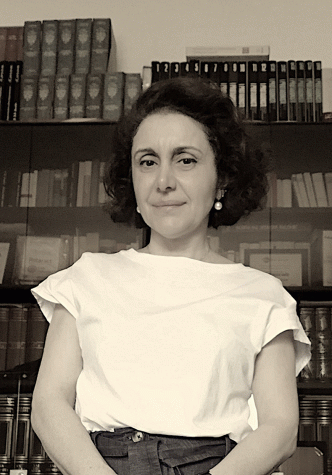Prof.ssa Francesca Dell'Acqua
Assoziierte Wissenschaftlerin

Francesca Dell'Acqua (PhD, Scuola Normale Superiore of Pisa) is Associate Professor of Medieval and Byzantine Art History at the University of Salerno. She is interested in cultural histories of the medieval Mediterranean. Using a trans-disciplinary and collaborative approach, studies texts, objects, and the ideas/beliefs they carry.
Her first monograph (Illuminando colorat. La vetrata tra l'età tardo imperiale e l'alto Medioevo: le fonti, l'archeologia, Spoleto, 2003) won her the Hahn Prize of the Bibliotheca Hertziana. The project she initiated on medieval ivories, supported by the KHI, was concluded with a volume of essays by various contributors (eds. F. Dell'Acqua, A. Cutler, H. L. Kessler, A. Shalem, and G. Wolf, The Salerno Ivories. Objects, Histories, Contexts, Berlin, 2016). More recently, she edited Pseudo-Dionysius and Christian Visual Culture, C.500-900 (London, 2020) and published the monograph Iconophilia. Politics, Religion, Preaching, and the Use of Images in Rome, c.680–880 (London, 2020).
She has been fellow at prestigious institutions, including the Bibliotheca Hertziana, the American Academy in Rome, Dumbarton Oaks, and the Centre for Byzantine, Ottoman, and Modern Greek Studies at the University of Birmingham.
- Early medieval Mediterranean
- Cultural history
- The transmission of ideas across time and space
- Material culture and associated ideas and beliefs
- Textual criticism
- Homilies, preaching, and visual arts as ‘mass media’ of the past
Soft power, authority, and leadership in the medieval West and Byzantium
The most recent developments in global politics, which see nationalistic machismo combined with military threat, invite the question whether leadership, authority, and ruling power can be combined with fairness and soft power. The concept of ‘soft power’ expresses the ability to achieve certain outcomes by attraction, persuasion, and legitimacy rather than by force (Nye, 1990a; 2021). It has acquired relevance in international politics since the 1990s, especially with regard to the evolving political entity of the European Union. However, no one has ever investigated if and how soft power was deployed, represented, and perceived with regard to authority and leadership in the Middle Ages, the formative period of the European nations. Although applying a modern concept to a distant historical period is methodologically wrong, the operations of soft power are as old as human history and not limited to the western world.
In collaboration with specialists from other fields in Medieval and Byzantine studies (political history, textual criticism, visual studies), I intend to look at written/oral/visual evidence related to specific examples of spiritual, religious, and political rulers, leaders, and saints across genders, in order to identify and comment on the following: how their authority and leadership were represented in various media; whether and how soft power had any role in constructing their image as well as ideas and practices of authority and leadership in the medieval West and Byzantium; whether soft power was alternative or complementary to traits of traditional authority; whether it was associated with the exercise of power and authority by a specific gender; how it was represented and perceived in the medieval period; whether it was represented differently in media with restricted circulation vs ‘mass media’.


